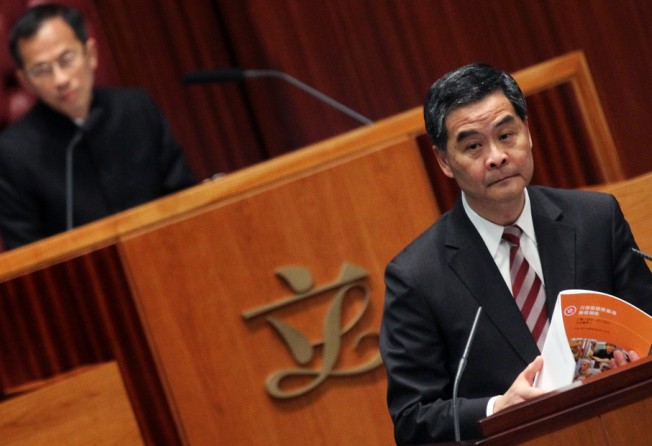CY Leung's policy address lacks vision to transform Hong Kong
Regina Ip says the chief executive's policy address, though admirably responsive to livelihood concerns, notably lacks a plan to propel Hong Kong to the next stage of its development

Every year, in the run-up to the delivery of the policy address, political parties make a mad dash to meet the chief executive or demonstrate outside the government's headquarters to press their demands for sundry measures to improve people's livelihood. Demands for affordable housing have topped the list, followed by demands for more support for the working poor, more hospitals, more homes for the elderly, and more public funding for preschool education, to name a few.
The long wish list is to be expected.
The chief executive cannot be faulted for failing to heed the people's concerns. Whereas in his first policy address, Leung Chun-ying mostly outlined his vision for Hong Kong and the underlying considerations for his economic policy, this year, he plunged into specific measures to support the economy and assist the poor, the elderly and the disadvantaged right from the start.
Leung also gave priority to nurturing the young. In the chapter devoted to upgrading the educational and skills level of the younger generation, efforts were made to take into account the learning needs of students of different cohorts and abilities. Except for a lack of reference to inadequate international school places, Leung deserves credit for comprehensively responding to miscellaneous demands for greater support for education.
The chief executive's agreement to provide up to 100 scholarships for outstanding local students to study at the world's best universities is noteworthy. Hong Kong students' presence in the world's top universities is increasingly being overtaken by a growing intake from mainland China and South Korea.
Although the scholarship programme will not yield immediate results, it provides a boost for bright local students unable to study abroad because of a lack of funds. More publicly funded overseas scholarships will help provide equal opportunities. Over time, such a programme will help Hong Kong to groom a pool of truly globally competitive, top-notch talent.
The policy address naturally had its share of critics, ranging from those who fear the rapid escalation of recurrent public expenditure and the need for tax hikes, to those who complained that the poverty-relief package neglects the middle class. Yet middle-class stalwarts who pulled themselves up by their bootstraps have often said they do not need any help from the government. All they want is a sound education system and a self-restraining government that refrains from interfering in the economy.
Perhaps the greatest weakness of the policy address was its lack of a holistic vision on the positioning of Hong Kong in China's and the world's rapidly changing economy. There is a lack of a fundamental review of the greatest strengths by which Hong Kong has thrived, and how Hong Kong should reposition itself to meet rising challenges.
Hong Kong was annexed by Britain for the purpose of trade, and has always thrived on trade. Post-war Hong Kong successfully reinvented itself as a light manufacturing centre. Having lost its manufacturing capability, the city now makes a living mainly as a service economy, its chief customer being mainland China.
Hong Kong has long been a poster child of a free-market economy. For 20 years, it has been voted the world's freest economy by the Heritage Foundation. But not only is the gap between Hong Kong and second-placed Singapore vanishing, questions have been raised, but not answered, on whether the small-government, laissez-faire model is still relevant.
The fact is, to increase the value of the economy, whether by branding or technology, a government needs to do a lot more to encourage investment in research and development, the study of "hard science", and greater use of technology by enterprises.
Unfortunately, successive administrations before and after 1997 failed to grasp the nettle of the new digital economy but clung to its old model. As a result, Hong Kong today is too heavily dependent on mainland China's "pro-Hong Kong" policies to shore up its domestic economy. Nor has it found ways to get round the bottleneck of its development - the acute shortage of land to meet growing housing and infrastructural needs and the labour shortages in several key areas.
Chief Secretary Carrie Lam Cheng Yuet-ngor said in the latest review of Hong Kong's population policy that there is no ceiling to population growth. Yet Hong Kong is already highly developed, if not developed to the full. Short of making inroads into country parks, there is little space for further physical development.
As Hong Kong continues to democratise, it is also running into a bottleneck of prolonged and indecisive public consultations in the political arena, and gridlock in the legislature.
As classical historian Ian Morris pointed out, great cities and empires have in the past been brought to their knees by "the paradox of development", whereby success creates tough ceilings that will yield only to truly transformative changes.
Hong Kong people can judge for themselves whether transformative changes are in the offing.
Regina Ip Lau Suk-yee is a legislator and chair of the New People's Party